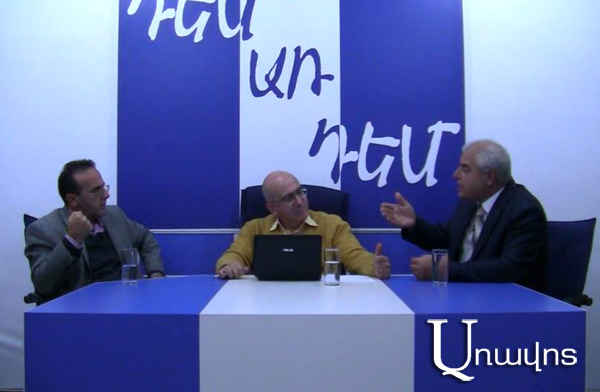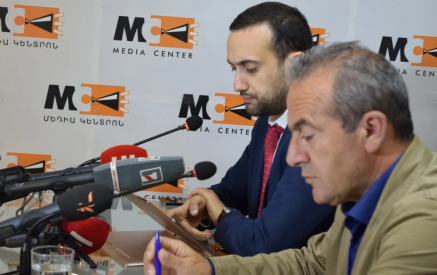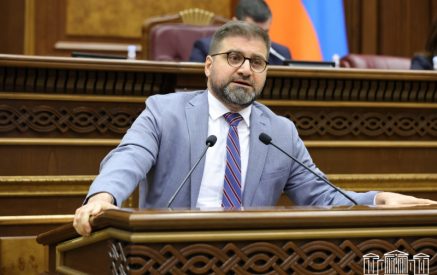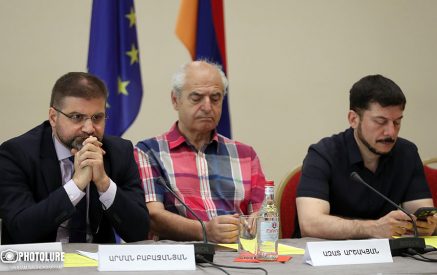The theme of “Aravot” online “Face to Face” talks show is discussed by Azat Arshakyan, political prisoner of the Soviet times, and Artur Sakunts, the Head of HCA Vanadzor office.
Aram Abrahamyan – By your subjective perception, what is the meaning of a political prisoner in general and particularly in Armenia?
Aghasi Arshakyan – If we say it in short, if someone having other opinion about the existing government is arrested, detained and subjected to criminal prosecution for his opinion, in other words, for the political views, he is a political prisoner. But the cases are not expressed clearly. The Soviet Union was honest in that sense, it has 3 specific Articles, whereas in Armenia, these are “prim” Articles 65, 67 and 203, which were purely political ones and were called an “anti-Soviet propaganda.” There was just propaganda through spreading out of rumors, it was a mild one – up to 3 years in prison, and there was of for destroying the country. We, my friends and I, were destroying ones. So, there were these 3 Articles, and people knew who are convicted by these Articles were political criminals.
A. A. – There are no such Articles in the independent Armenia. By your formulation, are there European standards and criteria?
Read also
Arthur Sakunts – A few years ago, Parliamentary Assembly of the Council of Europe adopted standards, and, to be honest, it was not surprising, too. The Council of Europe exists since 1950, and now decided after the access of the Eastern Europe because it was dealing with such issues: political subtext, terms of imprisonment, treatment to imprisonment, etc. When we were making a reference to the existence or absence of the standards, it’s a bit absurd, because not everything that can be measured. There is a specific situation and there is a specific action, regardless of whether those standards are available or not. It is clear that Shant Harutyunyan and his friends are politicians, and they have made a political statement. Even if they say that we are going to make a death attempt to a state political leader, it still has a political goal, because he is not going to take Baghramyan 26 and make it his home. In other words, there is a clear political sentiment, a position, in the public expression. We have an Article for such political subtext, Article No. 316, when there is a violence against the representative of the government; he is politician, why there should be a difference between the violence against the representative of the government and the ordinary citizens. Look, what they did with Shant family, at first, they are accused by Article 316, but with regard to the March 1 events, when Article 316 (1) was widely used, they saw that they are truly Articles and moved it to the Article on hooliganism. A public event, the Article on hooliganism was not administered against the participant of the free rally. And with regard to the standards, I must say that if you want to make a reference to the standards, the matter here is purely in the political sentiment, because such a punishment, even if an ordinary citizen performs some action, and disproportionate punishment is administered against him, it has a political subtext for Armenia.
A. A. – They also say that Vardan Petrosyan and Volodya Avetisyan, also like Shant Harutyunyan, are political prisoners. Do you agree or not?
A. Arshakyan – I do not know, I’m not familiar with the system of these standards, but I will say by subjective opinion, generally rebellious people and rioters are not saints, and in the Soviet Union and in dictatorships, this dissident is charged by the political article in exceptional cases. Usually, other mechanisms are used, because they go beyond the standards in something. They are people who do not respect the standards. A deed that does not comply to the acting law is always found with them, or they just fabricate it.
The discussion in full
Prepared by ARAM ABRAHAMYAN
“Face to Face” talk show series are released by the Open Society Foundations- Armenia. The views and analyzes found in this broadcast express the opinions of the participants, and are not approved by the Open Society Foundations-Armenia, or its Board. This broadcast is made available thanks to comprehensive financial support by the Open Society Foundations-Armenia, under the mass media support program, grant No 18624.
























































